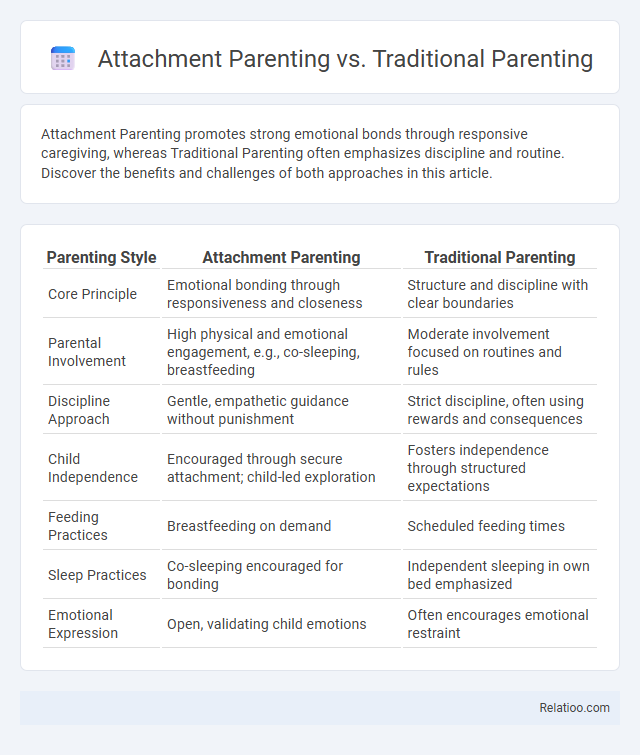Attachment Parenting promotes strong emotional bonds through responsive caregiving, whereas Traditional Parenting often emphasizes discipline and routine. Discover the benefits and challenges of both approaches in this article.
Table of Comparison
| Parenting Style | Attachment Parenting | Traditional Parenting |
|---|---|---|
| Core Principle | Emotional bonding through responsiveness and closeness | Structure and discipline with clear boundaries |
| Parental Involvement | High physical and emotional engagement, e.g., co-sleeping, breastfeeding | Moderate involvement focused on routines and rules |
| Discipline Approach | Gentle, empathetic guidance without punishment | Strict discipline, often using rewards and consequences |
| Child Independence | Encouraged through secure attachment; child-led exploration | Fosters independence through structured expectations |
| Feeding Practices | Breastfeeding on demand | Scheduled feeding times |
| Sleep Practices | Co-sleeping encouraged for bonding | Independent sleeping in own bed emphasized |
| Emotional Expression | Open, validating child emotions | Often encourages emotional restraint |
Understanding Attachment Parenting
Attachment Parenting emphasizes creating a secure emotional bond through practices like responsive feeding, co-sleeping, and gentle discipline, fostering trust and healthy development in children. Unlike Traditional Parenting, which often relies on structured rules and authoritarian approaches, Attachment Parenting prioritizes sensitivity to a child's needs and emotional cues. Effective supervision complements this approach by ensuring safety while respecting the child's autonomy and promoting a nurturing environment.
Defining Traditional Parenting Approaches
Traditional parenting approaches emphasize hierarchical family roles, obedience, and discipline, often relying on structured routines and clear boundaries. This style typically prioritizes parental authority and consistency in enforcing rules to shape children's behavior. In contrast, attachment parenting fosters emotional bonding and responsiveness, while supervision centers on monitoring and ensuring safety without necessarily involving direct nurturing or strict discipline.
Core Principles Compared
Attachment Parenting emphasizes responding sensitively to a child's emotional needs, promoting close physical contact and consistent nurturing to foster secure bonds. Traditional Parenting often relies on structured routines, clear boundaries, and discipline to guide behavior and ensure responsibility. Supervision prioritizes vigilant monitoring and safety oversight to prevent harm, focusing on watchfulness rather than emotional connection or strict discipline.
Emotional Bonding and Child Development
Attachment parenting fosters a strong emotional bond through physical closeness and responsive caregiving, enhancing secure attachment and promoting healthy child development. Traditional parenting often emphasizes discipline and routine, which can support structure but may limit emotional expression and bonding opportunities. Your active supervision balances guidance and emotional support, ensuring safety while nurturing autonomy and social skills essential for overall child development.
Discipline: Gentle Guidance vs Structured Rules
Attachment parenting emphasizes gentle guidance, prioritizing emotional connection and empathy to foster discipline through understanding and positive reinforcement. Traditional parenting often relies on structured rules and clear consequences to maintain order and ensure compliance. Your approach to discipline can balance these methods, blending compassionate communication with consistent boundaries to support your child's development effectively.
Impact on Child Independence
Attachment Parenting fosters a strong emotional bond that promotes secure attachment, encouraging your child's confidence to explore independently. Traditional Parenting often emphasizes structured rules and discipline, which can instill respect for authority but may limit spontaneous decision-making skills. Supervision balances guidance with freedom, enabling children to develop autonomy while ensuring safety, ultimately supporting gradual growth in independence.
Role of Parental Responsiveness
Parental responsiveness plays a crucial role in Attachment Parenting by fostering a secure emotional bond through consistent sensitivity to a child's needs, promoting trust and emotional regulation. In Traditional Parenting, responsiveness often balances discipline with nurturing, emphasizing structured boundaries while providing support that encourages independence. Supervision prioritizes attentive monitoring and timely intervention, ensuring safety and appropriate behavior, which reinforces parental involvement without as much emphasis on emotional attunement.
Socialization and Peer Relationships
Attachment parenting promotes secure emotional bonds, fostering empathy and effective communication skills in children, which enhance socialization and peer relationships. Traditional parenting often emphasizes discipline and obedience, potentially limiting opportunities for children to develop independent social skills and peer interactions. Supervision balances guidance and autonomy, allowing children space to navigate peer relationships while ensuring safety and appropriate social behavior.
Long-Term Outcomes and Research Findings
Attachment parenting fosters secure emotional bonds through consistent responsiveness, which research links to improved social skills and emotional regulation in adulthood. Traditional parenting, often characterized by structured discipline and clear boundaries, has been associated with higher academic achievement and self-discipline but may result in varying emotional outcomes depending on parental warmth. Your choice between these approaches and supervision intensity can influence long-term developmental trajectories, with studies emphasizing the importance of balanced emotional support and guidance for optimal child well-being.
Choosing the Best Parenting Approach for Your Family
Choosing the best parenting approach for your family depends on understanding the core principles of Attachment Parenting, Traditional Parenting, and Supervision. Attachment Parenting emphasizes close bonding and responsiveness to a child's needs, fostering emotional security and strong parent-child connections. Traditional Parenting values structure and discipline, promoting respect and responsibility, while Supervision focuses on actively monitoring and guiding children's activities to ensure safety and appropriate behavior.

Infographic: Attachment Parenting vs Traditional Parenting
 relatioo.com
relatioo.com